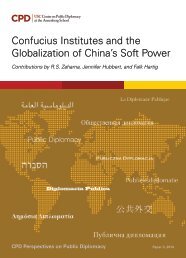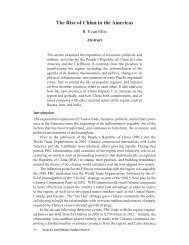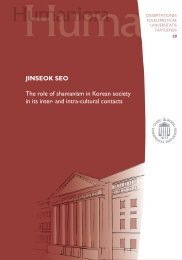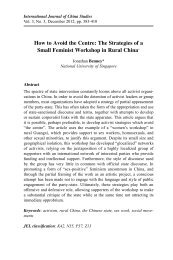JennyChan.PhDThesis.2014.FINAL
JennyChan.PhDThesis.2014.FINAL
JennyChan.PhDThesis.2014.FINAL
Create successful ePaper yourself
Turn your PDF publications into a flip-book with our unique Google optimized e-Paper software.
in supplier factories by reiterating their commitment to good governance in an<br />
attempt to distance themselves from responsibility and burnish their reputation<br />
internationally. This is in part a response to the growing anti-sweatshop movement in<br />
the electronics industry from within the United States, Europe, and more recently<br />
Greater China. 38 Many image-conscious technology companies, probably none more<br />
than Apple in our digital age, have professed noble ideals of corporate citizenship,<br />
environmental, labor and social responsibility in their supplier codes of conduct.<br />
Violations of factory workers’ fundamental rights in export-oriented industries<br />
nevertheless remain intractable, prompting scholars and practitioners of corporate<br />
responsibility to promote the leverage of private and public power to create “just<br />
supply chains.” 39 The main effort of public-private partnerships is to call on a shared<br />
commitment of national governments, transnational corporations, and<br />
non-governmental labor organizations to better protect workers.<br />
Frederick Mayer and Gary Gereffi suggest that the consolidation of capital in China<br />
potentially strengthens state regulation or “public governance” of transnational<br />
firms. 40 Similarly, Richard Locke understands the Chinese government to be<br />
incentivized to “play a positive role in promoting collaborative buyer-supplier<br />
relations” in its pursuit of sustainability and global competitiveness. 41 I challenge this<br />
assessment, which tends to downplay capitalist contradictions and power relationships<br />
in transnational production on the one hand, and the strong collaboration between<br />
capital and the state in wealth accumulation on the other hand. Chinese workers, as<br />
discussed in the empirical chapters (from chapters 3 to 10), unveil the harsh reality<br />
behind the mainstream discourse of “corporate ethics” and “social harmony.” 42<br />
Research Methodology<br />
My project is about the conditions of labor in China as seen through the words and<br />
actions of employees, including particularly rural migrant workers and student<br />
interns, who are most central to the hidden abode of production. This sociological<br />
38 Ralph A. Litzinger, 2013, “The Labor Question in China: Apple and Beyond,” The South Atlantic<br />
Quarterly 112(1), pp. 172-78.<br />
39 See for example, John Ruggie, 2013, Just Business: Multinational Corporations and Human<br />
Rights, New York, NY: W. W. Norton & Company; Boston Review, 21 May 2013, “Forum: Can<br />
Global Brands Create Just Supply Chains?”<br />
http://www.bostonreview.net/forum/can-global-brands-create-just-supply-chains-richard-locke<br />
40 Frederick Mayer and Gary Gereffi, 2010, “Regulation and Economic Globalization: Prospects and<br />
Limits of Private Governance,” Business and Politics 12(3), pp. 15-17.<br />
41 Richard M. Locke, 2013, The Promise and Limits of Private Power: Promoting Labor Standards in<br />
a Global Economy, Cambridge: Cambridge University Press, p. 19.<br />
42 Hexie shehui ( 和 諧 社 會 ).<br />
12






